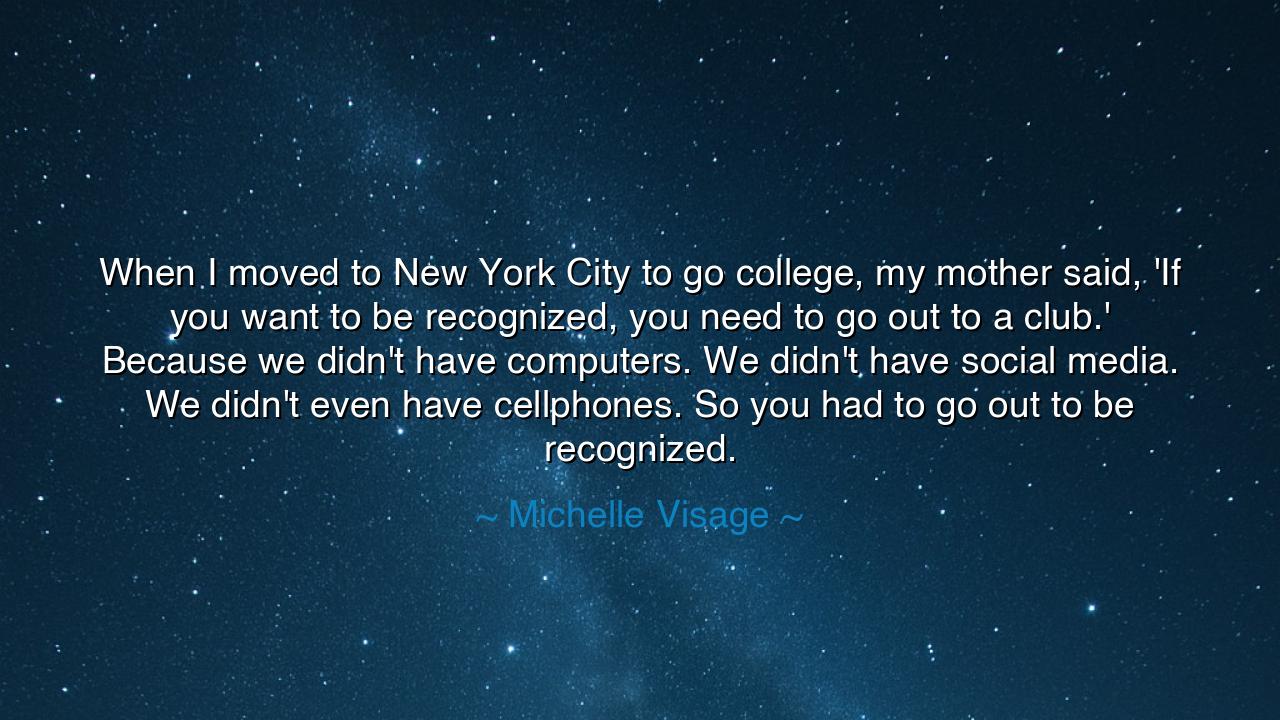
When I moved to New York City to go college, my mother said, 'If
When I moved to New York City to go college, my mother said, 'If you want to be recognized, you need to go out to a club.' Because we didn't have computers. We didn't have social media. We didn't even have cellphones. So you had to go out to be recognized.






“When I moved to New York City to go to college, my mother said, ‘If you want to be recognized, you need to go out to a club.’ Because we didn’t have computers. We didn’t have social media. We didn’t even have cellphones. So you had to go out to be recognized.” – Michelle Visage
In this vivid remembrance, Michelle Visage, the iconic performer and judge, speaks not only of a personal story but of a truth that belongs to an older age—the age before the glowing screens and the constant hum of digital connection. Her words are a doorway to a time when recognition had to be earned in the physical world, not through algorithms or followers, but through presence, charisma, and courage. When she recalls her mother’s advice—“you need to go out to a club”—she is passing down a lesson written in the language of human connection: that to be seen, one must first show up, to life, to others, and to oneself.
Her quote carries the spirit of an era when New York City was a crucible of creativity—a living stage where dreams were forged in sweat and rhythm. The club, in that world, was more than a place of music and dance; it was a temple of visibility, where one’s identity was shaped not by filters or curated images, but by energy, by interaction, by the courage to step into the light. There, among strangers and song, people learned to be seen—not through the lens of a camera, but through the gaze of another living soul. It was an age of authentic presence, where every handshake, every glance, every performance was a declaration: I am here.
Visage’s reflection reveals a profound contrast between two worlds—the tangible and the digital. In her youth, recognition was born of effort and engagement. To be known required movement, conversation, and daring; one had to venture out from the safety of solitude into the chaos of life. Today, a person may reach millions without ever leaving their room, yet still feel unseen. Her words remind us that technology, for all its wonders, cannot replace the electricity of human connection—the shared laughter, the rhythm of a crowd, the pulse of belonging that no screen can reproduce.
There is an echo here of the ancient philosophers who believed that greatness could only be achieved through participation in the agora, the public square of discourse and art. In Athens, one’s reputation was not built by messages sent through invisible currents, but by standing among peers, speaking boldly, creating openly. To retreat entirely from that world was to fade into obscurity. In the same way, Visage’s mother was calling her daughter to the arena of visibility, urging her not to hide her light, but to step into the places where others gather to celebrate life.
Consider the story of Josephine Baker, the legendary performer who left America to find her fame in Paris during the 1920s. In her time, there was no social media, no television to broadcast her brilliance. She became known through her daring presence on the stage, her ability to mesmerize a room. Every night she went out—not to seek fame for its own sake, but to live fully, to express without apology. Like Michelle Visage, she understood that to be recognized, one must be present, fully and fiercely, in the spaces where art and humanity collide.
Visage’s words, then, are not merely nostalgic—they are instructive. They remind us that recognition without connection is hollow. In an age where fame can be manufactured in moments, her story teaches that true visibility comes from authenticity, from daring to be yourself among others, not behind the veil of technology. To be recognized, in her sense, is not just to be known, but to be felt—to leave an impression that lingers beyond pixels and posts.
So let her mother’s wisdom become a mantra for our own time: “If you want to be recognized, go out into the world.” Step into the spaces where real people live and breathe. Speak your truth aloud, not only through text. Dance, share, listen, and look into the eyes of others. Let them see you—not as an image, but as a living being. For in every era, whether ancient or modern, the path to recognition remains the same: to live with presence, to engage with courage, and to shine not from behind a screen, but beneath the open sky of life itself.






AAdministratorAdministrator
Welcome, honored guests. Please leave a comment, we will respond soon